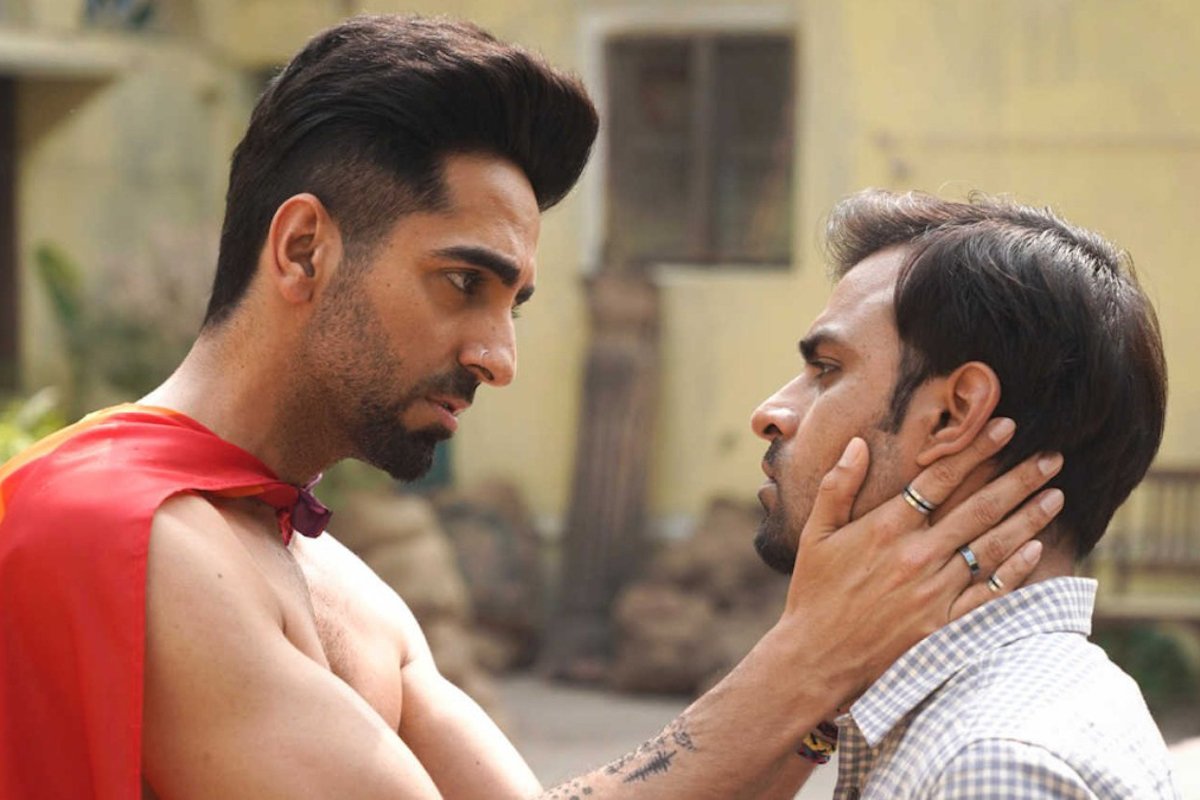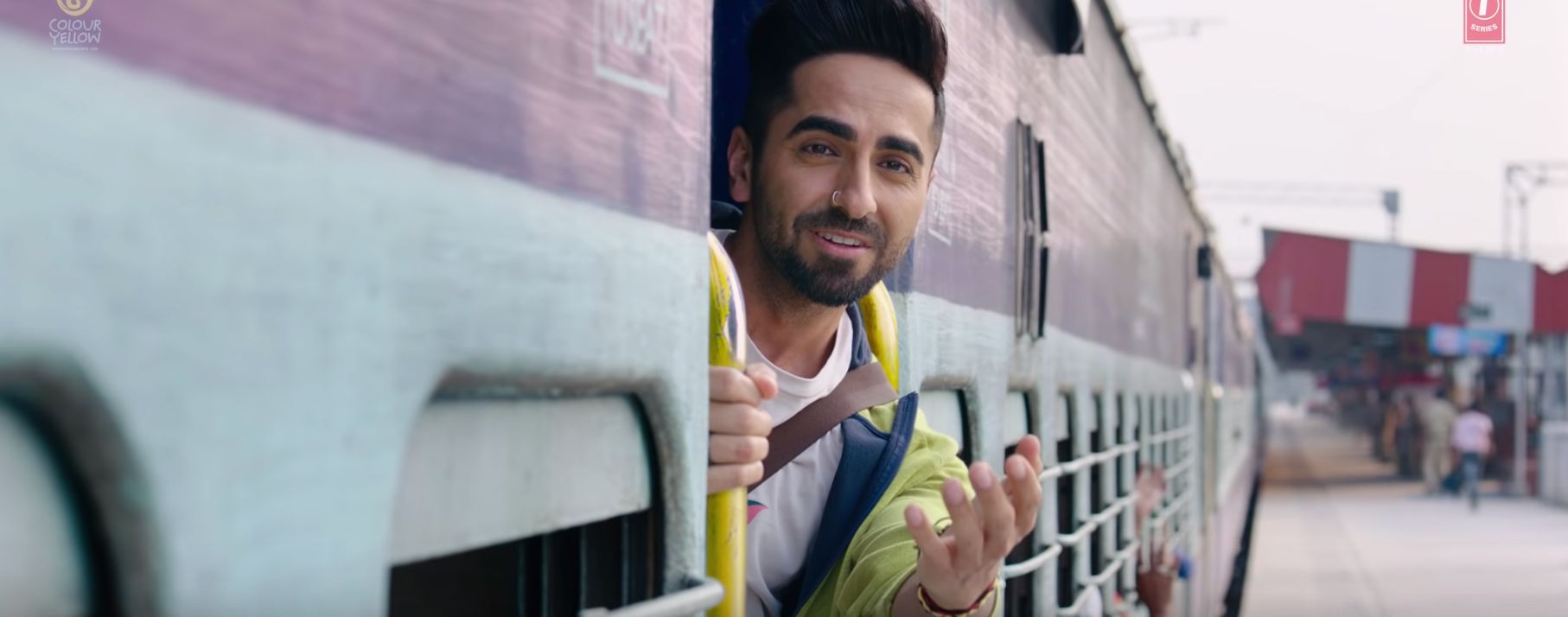
Starring Ayushman Khurrana and Jitendra Kumar in the lead roles, Shubh Mangal Zyada Saavdhan (SMZS) is arguably the first Bollywood film featuring an openly gay couple. Though Indian cinema has made significant strides in queer character inclusion over the past few years (most notably Ek Ladki Ko Dekha Toh Aisa Laga and Kapoor & Sons), Bollywood has traditionally characterized homosexuality in an almost offensively comedic manner. SMZS subverts these stereotypes by making homophobia, rather than homosexuality, the butt of the jokes.
Homosexuality Explained in Simple Terms

SMZS strives to illustrate gay love in a normalized manner; Kartik (Khurrana) and Aman (Kumar) are simply a young couple in love—they just happen to both be men. In a country in which gay sex has been legal for less than five years, people still view homosexuality very much as an active choice, rather than a biological characteristic. The film effectively illustrates this mindset when Aman’s uncle, Chaman (Manu Rishi), earnestly asks Kartik “when did you decide to be gay?” During the ensuing conversation, in which Kartik retorts back “when did you decide to not be gay,” Chaman understands Kartik’s implication: sexuality is not a decision, but rather an inherent quality.
Aman later reiterates Kartik’s point in a more empirical manner. In an effort to appeal to his scientist father, Aman explains that being in love has the same effect on the body—dopamine is produced and oxytocin is secreted—regardless of whether the object of affection is a man or a woman. Keshav (Neeraj Singh) supplements his brother Aman’s speech with frequent attempts to show their father articles on the internet explaining that being gay is not immoral, and perhaps even acceptable. All of this dialogue occurs in the context of the Supreme Court’s impending decision on Section 377, which deems sexual activities “against the order of nature” illegal.
SMZS continually reiterates how popular opinion in India holds gay love as unnatural. Shankar (Gajraj Rao), Aman’s father, has a visceral reaction when he catches Aman and Kartik passionately liplocked in the back of a train. From physically throwing up to faking a suicide, Shankar leaves no stone unturned to get his son to just change. The extended family only contributes to the ensuing madness. When all else fails, they conduct funeral rites and a rebirth ceremony for Aman, firm in their belief that, this time, he will be born a straight man. The emotional blackmail, antiquated religious beliefs, and small-town mindsets are all the usual elements in a classic Indian drama.
A Nod to the Tropes Within Bollywood

The film’s witty first half eventually peters out into a tried and true Bollywood formula. Kartik bravely faces Shankar’s wrath in the form of a physical beating, while Aman watches helplessly from the side. Aman resigns himself to marriage with Kusum (Pankhuri Awasthy), his parents’ original choice for him, and nearly goes through with it, until Shankar discovers Kusum has run away with the family jewels and the veiled bride is actually a disguised Kartik. The subsequent chaos ends when Sunaina (Neena Gupta), Aman’s mother, predictably becomes first in the family to tentatively voice approval of Aman’s choice in partner.
When India’s Supreme Court rules Section 377 as unconstitutional, Shankar begrudgingly accepts his son’s relationship and SMZS’s other subplots get neatly wrapped in a bow. As he bids goodbye to Aman, Shankar quotes the famous line from DDLJ (Dilwale Dulhania Le Jayenge), “Ja, ja jee le apni zindagi” (“Go, go live your life”) and Aman runs to catch the train as Kartik extends his hand out to help him board. Many Bollywood films have recreated this iconic DDLJ scene since its inception in 1995, but SMZS boasts the first interpretation with both men in the frame.
SMZS’s strength lies in these nuanced inversions of Bollywood archetypes. Director Hitesh Kewalya does not dramatically break boundaries in his film. Rather, he plays within the safe confines of Bollywood, choosing instead to subtly point out the assumed heterosexuality within media—from written literature to digital film. There is a particularly poignant scene in the film when Kartik, upon hearing a child recite the Jack and Jill nursery rhyme, questions whether Jack was ever asked if he wanted to go up the hill with Jill or Johnny. The child’s father responds with ill-concealed irritation—“How would I know? It’s what’s written in the book”—and therein lies the rub. The reader takes for granted that the couple is heterosexual; anything else would be “abnormal.” Though SMZS may not invoke widespread change across the country, it may at least spark conversation around preconceived notions of normality.
• • •
Shubh Mangal Zyada Saavdhan—India. Dialog in Hindi. Directed by Hitesh Kewalya. First released February 21, 2020. Running time 1hr 57min. Starring Ayushmann Khurranam, Jitendra Kumar, Neena Gupta, Gajraj Rao.
